The Filipino artist tells Gary Evans how he went from dead-end jobs to directing animated movies in five years

Louie del Carmen hadn’t done any proper drawing for nearly a decade. The Filipino was living in Los Angeles. He bounced from one boring job to the next, a career detour, while he tried to work out what to do with himself. He eventually decided on animation. The problem was: he didn’t know if he could still draw, never mind draw professionally. As for animation, he’d never had any training in it.
Louie had completed a commercial art degree in Manila in 1985. Making money from drawing seemed impossible in those days. So he switched to computer programming. Soon after, he and his brothers decided to leave the Philippines for America.
“I found out quickly,” Louie says, “that, technologically, the standards in the US far outpaced my third-world education. That career detour was a period in which I was kind of in limbo. I needed to go back to school if was to make a go in computers, which was kind of deflating. I hadn’t even really considered returning to art, let alone animation.”
But Louie had connections. His brothers had started working in animation. Even if he could get a foot in the door, he had no work to show once he got there. So Louie spent two years working on his portfolio, then showed his work to Klasky Csupo.
Louie got a job at the animation company in 1995, started as a character designer, moved on to storyboards, and by 1999 was directing episodes of Rugrats and Rocket Power.
“That kind of growth can only happen if the environment is right,” he says, ”and Klasky Csupo, for all its perceived weird studio style and non-traditional pedigree, was a very nurturing and supportive environment to work at. I didn’t go to animation school. Klasky Csupo was my school.”
AN ACTIVE IMAGINATION
Esta historia es de la edición October 2018 de ImagineFX.
Comience su prueba gratuita de Magzter GOLD de 7 días para acceder a miles de historias premium seleccionadas y a más de 9,000 revistas y periódicos.
Ya eres suscriptor ? Conectar
Esta historia es de la edición October 2018 de ImagineFX.
Comience su prueba gratuita de Magzter GOLD de 7 días para acceder a miles de historias premium seleccionadas y a más de 9,000 revistas y periódicos.
Ya eres suscriptor? Conectar
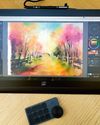
XPPen Artist Pro 19 (Gen 2)
Whether you’re a pro artist or a passionate hobbyist, this pen display offers something for everyone with beautiful colour and accurate drawing
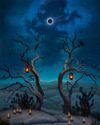
First Impressions
The artists explains how her imagination for fantasy was born
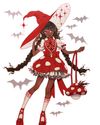
DRAW VIBRANT CHARACTER ART
LIDIA CAMBON reveals her step-by-step process for creating a full-body illustration from first sketch to vibrant, cohesive colour with markers
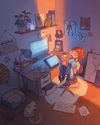
Photoshop & Blender: BUILD NARRATIVE USING INTERIORS
Find out how illustrator Magdalina Dianova creates a cosy setting that helps to express her character’s personality
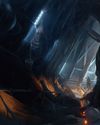
Blender, Procreate & Photoshop DESIGN CREEPY ARCHITECTURE
Nick Stath explains how he built an eerie, atmospheric environment for the sci-fi horrors of Alien: Romulus
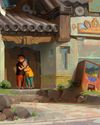
Photoshop - PAINT FAN ART WITH EMOTION
Baptiste Boutié goes in-depth on his approach for creating visual appeal in a tribute to Tekkonkinkreet

ZBrush, KeyShot & Photoshop - CRAFT A HIDEOUS ALIEN NIGHTMARE
Follow along as character and creature artist Kyle Brown makes xenomorph fan art inspired by Alien: Romulus

FEARFUL VISIONS
ImagineFX explores the visual heritage of the visceral Alien cosmos and its develooment over the franchise's history

Mike Butkus
Surf's up! Why coastal comforts lured the artist to his California home

The art behind Alien: Romulus
Xenomorphology Tanya Combrinck meets the Alien-obsessed concept artists who revived the visual style of the classic films